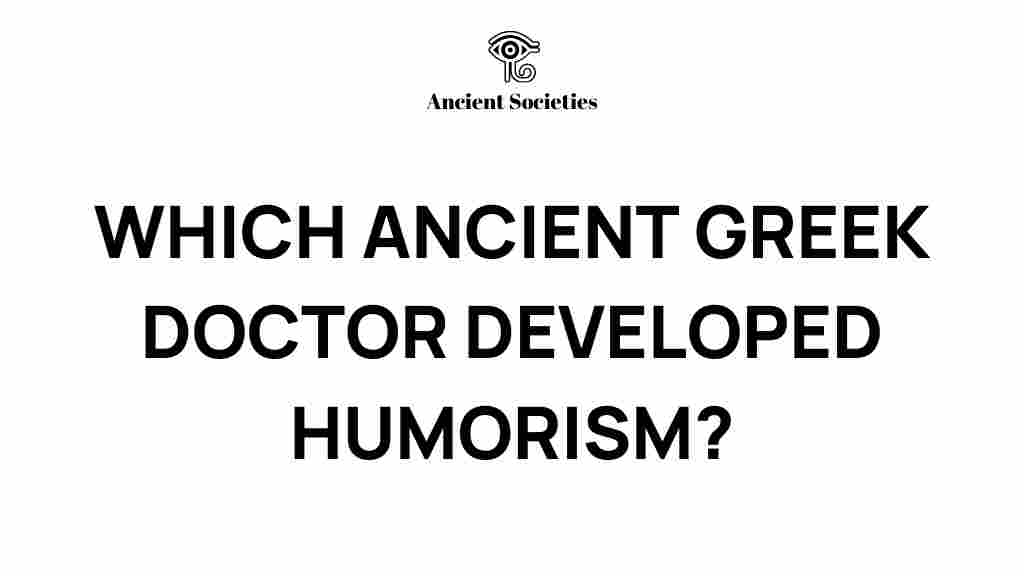Humorism: The Ancient Greek Medical Theory that Shaped Medicine
In the annals of medical history, few theories have had as profound an impact as humorism. This ancient medical practice, pioneered by the great Greek physician Hippocrates, laid the groundwork for understanding health and disease long before modern medicine came into existence. In this article, we will delve into the essence of humorism, explore its historical context, and examine its influence on the philosophy of health and medicine.
Understanding Humorism
Humorism is a medical theory that suggests that the balance of four bodily fluids, or “humors,” is essential for maintaining health. These humors are:
- Blood
- Phlegm
- Black bile
- Yellow bile
According to this theory, each humor corresponds to specific temperaments and health conditions. An imbalance in these humors was believed to cause disease and affect a person’s physical and mental state.
The Origins of Humorism in Ancient Greece
The roots of humorism can be traced back to Ancient Greece, where the pursuit of knowledge about the human body and its functions was fervent. Hippocrates, often regarded as the Father of Medicine, was instrumental in developing this theory. His observations and writings on medicine and health emphasized the importance of lifestyle, environment, and diet in maintaining balance within the body.
Hippocrates’ work laid the foundation for the practice of medicine, and his teachings on humorism were documented in the Hippocratic Corpus, a collection of texts that outlined medical practices and theories.
The Four Humors and Their Characteristics
Each humor had its distinct qualities, influencing both physical health and personality traits:
- Blood: Associated with a sanguine temperament, characterized by a sociable and carefree disposition.
- Phlegm: Linked to a phlegmatic temperament, often seen as calm and reliable, but can be sluggish.
- Black bile: Connected to a melancholic temperament, associated with introspection and sadness.
- Yellow bile: Tied to a choleric temperament, known for being ambitious and leader-like but can be quick-tempered.
The balance of these humors was thought to be critical for achieving optimal health. Physicians in Ancient Greece would often use humorism to diagnose and treat patients, adjusting their diets and lifestyle to restore balance.
Hippocrates and the Evolution of Medical Theories
Hippocrates’ contributions to medicine and health went beyond just humorism. He promoted a systematic approach to diagnosis and treatment, encouraging physicians to observe symptoms and understand the underlying causes of illness.
His emphasis on empirical observation paved the way for a more scientific approach to health, distinguishing him from other contemporaneous healers who relied heavily on supernatural explanations for disease. This shift was crucial in the development of medicine as a respected profession.
The Influence of Humorism on Ancient Medical Practices
Following Hippocrates, humorism became the dominant medical theory in Ancient Greece and later Rome. Physicians like Galen expanded on Hippocrates’ work, further categorizing diseases and treatments based on the humors.
Some of the common practices influenced by humorism included:
- Bloodletting: Removing blood to balance the humors, thought to alleviate various ailments.
- Dietary Changes: Adjusting food intake to enhance or reduce specific humors.
- Herbal Remedies: Using plants and herbs believed to influence the balance of humors.
These practices were prevalent throughout the Mediterranean region and were later adopted by medieval Islamic physicians and scholars, ensuring the longevity of humorism in medical discourse.
The Philosophical Underpinnings of Humorism
Humorism is not just a medical theory; it is deeply rooted in the philosophy of the time. Ancient Greek philosophers like Plato and Aristotle also pondered the nature of health and the human body, often linking physical states to emotional and mental conditions.
The philosophical approach to humorism emphasized the interconnectedness of body and mind. This holistic view is a cornerstone of many modern health practices, including holistic and integrative medicine.
Decline of Humorism and the Rise of Modern Medicine
Despite its influence, humorism began to decline with the advent of the scientific revolution and advancements in anatomy and physiology. The work of pioneers such as Andreas Vesalius, who challenged long-held beliefs about human anatomy, started to dismantle the humoristic framework.
By the 17th and 18th centuries, humorism was largely replaced by more empirically-based medical practices. However, its legacy persisted, influencing early medical education and the development of various diagnostic methods.
Contemporary Reflections on Humorism
Today, while humorism is no longer a valid medical theory, its historical significance cannot be overstated. Modern medicine still recognizes the importance of balance in health, albeit through a different lens.
Many practitioners now consider lifestyle factors, diet, and emotional well-being as integral components of health, echoing the holistic principles of ancient humorism.
Conclusion: The Lasting Legacy of Hippocrates and Humorism
In conclusion, humorism represents a pivotal chapter in the history of medicine. The work of Hippocrates and his followers not only shaped ancient medical practices but also laid the groundwork for future developments in health and wellness. While we have moved beyond the concepts of humors in contemporary medical practice, the emphasis on balance and the holistic approach to health remains relevant.
As we continue to explore the complexities of human health, the lessons from ancient Greek physicians remind us that understanding the interplay of body, mind, and environment is crucial for achieving well-being.
To learn more about the evolution of medical practices and theories throughout history, check out this comprehensive resource.
For insights into modern holistic health practices, visit this informative page.
This article is in the category History and created by AncientSocieties Team
